Assembled here are key sources that have shaped the modern Middle East, Zionism and Israel. We have included items that give texture, perspective and opinion to historical context. Many of these sources are mentioned in the Era summaries and contain explanatory introductions.
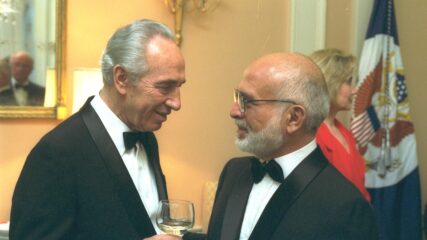
The Jordanian king and Israeli Labor Party leaders secretly outline a plan to convene an international conference to move Israeli-Palestinian talks forward through a conference format, but Likud opposition leaders squash the idea.

Jordan’s King Hussein made a strategic decision to disassociate administratively from the West Bank, leaving it to focus Jordanian national identity on only the east bank of the Jordan River. The PLO subsequently negotiated with Israel to rule over some of these lands, as codified in the 1993 Oslo Accords, but no Palestinian state was promised.

Four days before signing the Oslo Accords, the PLO and Israel recognize each other. Israel’s
Rabin worries about the growth of Hamas influence, thus elevates the PLO through international recognition.

Arafat offers gratitude to President Clinton for hosting this historic event, expressing hopes that the agreement will end a century of suffering and usher in peace coexistence and equal fights.
He acknowledges the courage of the people of Israel to seek the determination to build peace.
While advocating joint responsibility of Palestinians and Israelis to enforce the agreement, history shows that over the next decade, Arafat does not clamp down on violent attacks against Israelis.

Clinton expresses gratitude to those who brought about the possibilities of reconciling Israeli and Palestinian aspirations, and acknowledges past leaders, Menachem Begin, Anwar Sadat, Jimmy Carter, and George Bush for advancing the sides toward this moment of signing the Accords on Interim Palestinian Self-Government. Over the next two decades, funds pour into the West Bank and Gaza Strip and elections for a self governing authority are held, but autocratic rule and financial mismanagement prevail, stymying along with other reasons, successful Palestinian self-rule.
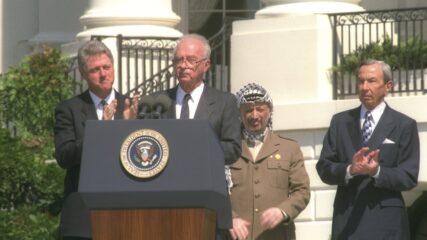
As a lifetime soldier-politician, Rabin acknowledges that the signing of the Declaration of Principles was profoundly difficult, and yet there is a yearning to end the cycle of violence and engage in reconciliation with the Palestinians. Drawing inspiration from Jewish tradition, he stresses the timeliness of pursuing peace and prays for a new era in the Middle East.
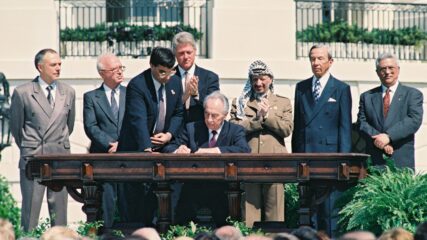
In September 2023, thirty years after the historic signing of the Oslo Accords, there is occasion to review Prime Minister Rabin’s understanding of them. I assembled this collection years ago from Daily Reports- Near East and South Asia, 1993-1995. Two short items about Rabin’s views are also found or linked here. Rabin provided a summary of his views of the Accords in a Knesset speech in October 5, 1995. Some of Rabin’s reasons for signing the Accords are also provided in Yehuda Avner’s The Prime Ministers.
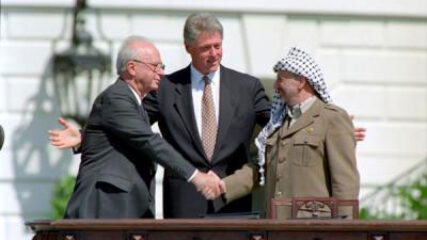
Negotiated through the Norwegians, the Oslo Accords call for limited Palestinian rule in some of the territories but do not call for a Palestinian state or an end to settlements.
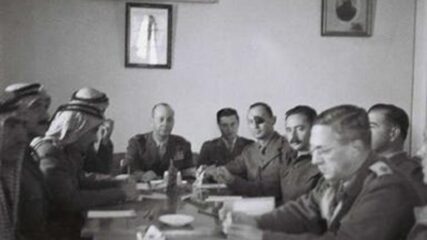
Forty-one documents compiled by the Israel State Archives illuminate the negotiations beginning in September 1993 that produced an Israel-Jordan peace treaty in October 1994.
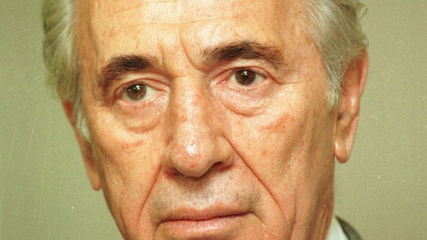
Foreign Minister Shimon Peres supports the Oslo Accords, opposes a Palestinian state and rejects Israel’s role in the Gaza Strip as the enforcer of security — all views that have continuing relevance for Gaza.
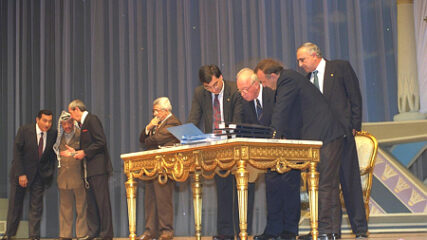
An Israel State Archives document collection shows how Israel and the Palestine Liberation Organization negotiated under the Oslo Accords to achieve an agreement in May 1994 on Palestinian autonomy in Jericho and the Gaza Strip.
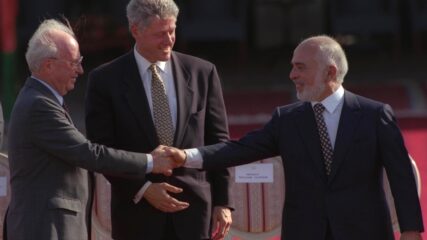
Jordan becomes the second Arab country after Egypt (1979) to sign a peace treaty ending the state of war with Israel. The Treaty addresses boundary demarcations, water sharing, police and security cooperation, environmental issues, border crossings, administration of Muslim holy sites and other issues.
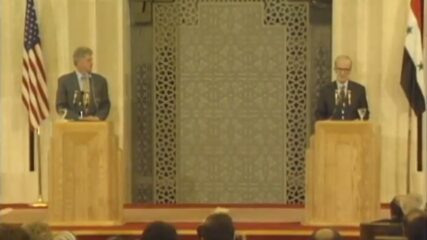
A day after the signing of the Jordan-Israel peace treaty and hours before addressing the Knesset, U.S. President Bill Clinton meets with his Syrian counterpart, Hafez al-Assad, in Damascus and expresses optimism that Syria will be part of a comprehensive Middle East peace. Assad continues to insist on the full return of the Golan Heights.
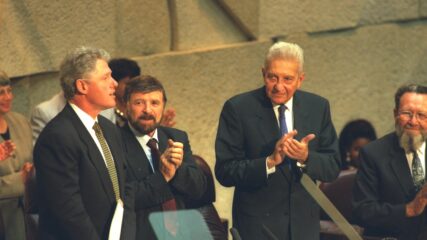
In only the second Knesset address by a U.S. president, Bill Clinton hails the treaty Jordan and Israel signed the previous day as part of a peaceful wave sweeping the region, including the year-old Oslo Accords and soon a likely treaty with Syria.
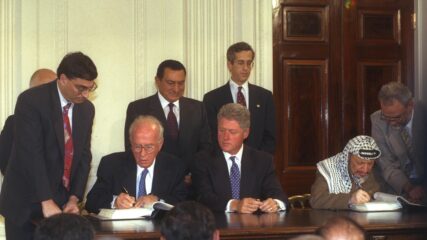
This was the fourth Palestinian-Israeli Agreement signed that broadly extended Palestinian self-governing arrangements throughout the West Bank and the Gaza Strip. No Palestinian state was promised, essentially only putting substance on the Palestinian autonomy agreement that Menachem Begin signed with Anwar Sadat in the 1978 Camp David Accords.
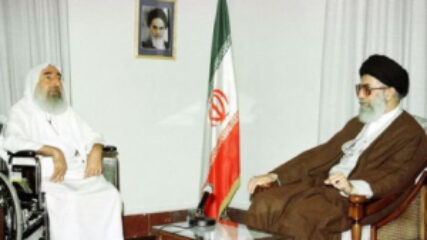
Days before his assassination, Yitzhak Rabin explains that he accepted the Oslo Accords and shook Yasser Arafat’s hand because the PLO represented the last hope for a secular Palestinian nationalism amid the rise of Hamas.

In 1995, Senators Robert Dole and Jon Kyl introduced the Jerusalem Embassy Act to move the U.S. Embassy to Jerusalem. The bill was adopted by an overwhelming majority in both houses of Congress; it provided Presidential authorization to effectively delay the embassy move every six months, if deemed necessary for U.S. national security interests.

The Israeli investigation concludes that Yigal Amir is Rabin’s assassin. The Commission does not assess the impact on the assassin of the vicious language directed at Rabin for signing the Oslo Accords.
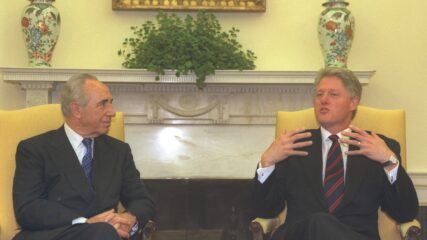
President Clinton and Prime Minister Peres agree to deepen cooperation between their countries through regular consultation in all economic, political, military spheres.
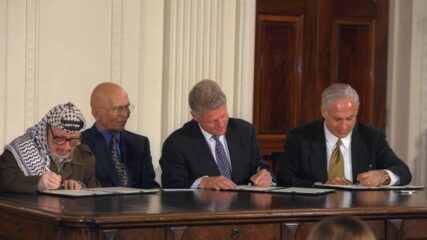
With Israeli-Palestinian talks in a hapless state, President Clinton rejuvenates them. In the Arafat-Netanyahu agreement Israel shares Hebron, with the CIA playing a role in West Bank security.




















